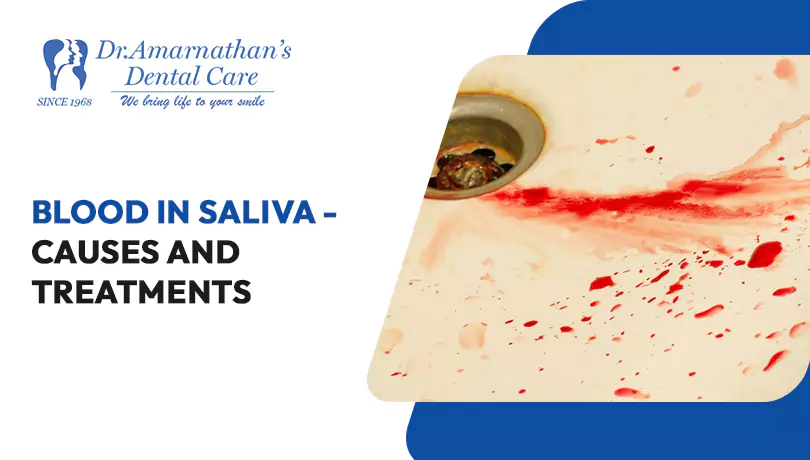
Blood in Saliva – Causes and Treatments
The presence of blood in your saliva might be leading to instant fear. While a tiny amount of blood may appear to be harmless, it might indicate a more serious underlying issue. Understanding the many causes of blood in saliva is essential for selecting the best plan of action. This blog looks at the frequent and unusual causes of blood in saliva from a dental perspective, as well as various remedies and when to seek expert medical guidance. Understanding the numerous causes of blood in Spit Up allows you to manage this potentially frightening situation with confidence and clarity.
How do you identify blood in saliva?
Identifying blood in saliva requires the observation of a few essential signs. Your saliva may seem crimson or pinkish, particularly after brushing, flossing, or eating. A metallic taste may occasionally appear on your tongue.
Blood in saliva might appear in the form of streaks or minute clots. If you have these symptoms on a frequent basis, there is a chance that blood will appear in your saliva. It is essential to visit a healthcare expert to discover the reason for this and obtain the necessary therapy.
Common Causes of Blood in Saliva
1. Gum Disease (Gingivitis and Periodontitis)
Gum disease, caused by plaque accumulation, can cause inflammation and infection in the gums, leading to bleeding.
Symptoms: Swollen, red, and bleeding gums, particularly after brushing or flossing.
Treatment: Professional dental cleaning, better oral hygiene practices, and maybe antibiotics or surgery for severe conditions.
2. Injury or Trauma
Physical injuries to the mouth, such as biting the face, tongue, or lips, or external damage, can result in blood in saliva.
Symptoms: Visible wounds, bruising, or swelling in the affected place.
Treatment: Rinse with salt water, use ice, and seek medical assistance if the damage is serious.
3. Infections
Oral infections, whether viral, bacterial, or fungal, can result in blood in spit up
Symptoms: Soreness, poor breath, and swelling.
Treatment: Depending on the type of infection, antivirals, antibiotics, or antifungals are usually used to treat blood in the saliva.
4. Brushing or Flossing
Aggressive brushing and flossing might cause bleeding in fragile tissues of the mouth.
Symptoms: Bleeding occurs during or after brushing and flossing.
Treatment: Use a soft-bristled toothbrush, gentle brushing techniques, and adequate flossing procedures.
5. Medications
Certain drugs, notably blood thinners, can increase the risk of bleeding in the mouth without causing evident harm.
Symptoms: Unexpected bleeding in the absence of visible injury or trauma.
Treatment: To properly reduce symptoms, consult your healthcare providers to change dosages or prescribe other medications.
6. Systemic Conditions
Underlying systemic diseases such as vitamin deficiency, blood abnormalities, or infections can cause bleeding gums as a symptom.
Symptoms: Additional symptoms associated with the underlying illness (for example, tiredness and easy bruising).
Treatment: The underlying issue is treated through medications, dietary changes, or specialized therapy as directed by healthcare specialists.
7. Oral Cancer
In rare situations, blood in the saliva might suggest oral cancer.
Symptoms: Persistent sores, lumps, or alterations in the oral tissue.
Treatment: Regular dental check-ups can help discover cancer early, followed by suitable therapies such as surgery, radiation, or chemotherapy.
Medical Treatment for Blood in Spit up:
Professional Dental Cleaning: Scaling and root planning are used to remove plaque and calculus from the gums, reducing irritation and bleeding.
Advanced Periodontal Treatment: Deep cleaning procedures, antibiotics, and laser treatments are used to successfully control gingivitis and periodontitis, restoring gum health and reducing bleeding.
Surgical Procedures: Gum flap surgery, gum grafting, and bone regeneration procedures are used to treat severe periodontal disease and restore gum health while minimizing bleeding.
Antibiotic therapy: Oral antibiotics are used to treat infections that cause gum disease and oral bleeding, promoting healing and preventing additional issues.
Management of systemic factors: Coordinating with other healthcare practitioners to address systemic issues, such as vitamin deficiencies or blood diseases, that affect dental health and lead to bleeding gums ensures complete care.
Summary :
Finally, the presence of blood in saliva may point to a number of disorders, ranging from simple oral hygiene concerns to more significant medical diseases. Promptly identifying the problem through expert evaluation is essential for optimal treatment and management. Early intervention plays an important role in minimizing difficulties and boosting overall oral well-being, whether it’s through basic oral hygiene habits, dental treatments, or addressing systemic health risks. Consultation with a healthcare practitioner or dentist enables specialized care adapted to individual needs, promoting a healthier and more confident attitude to oral health.




